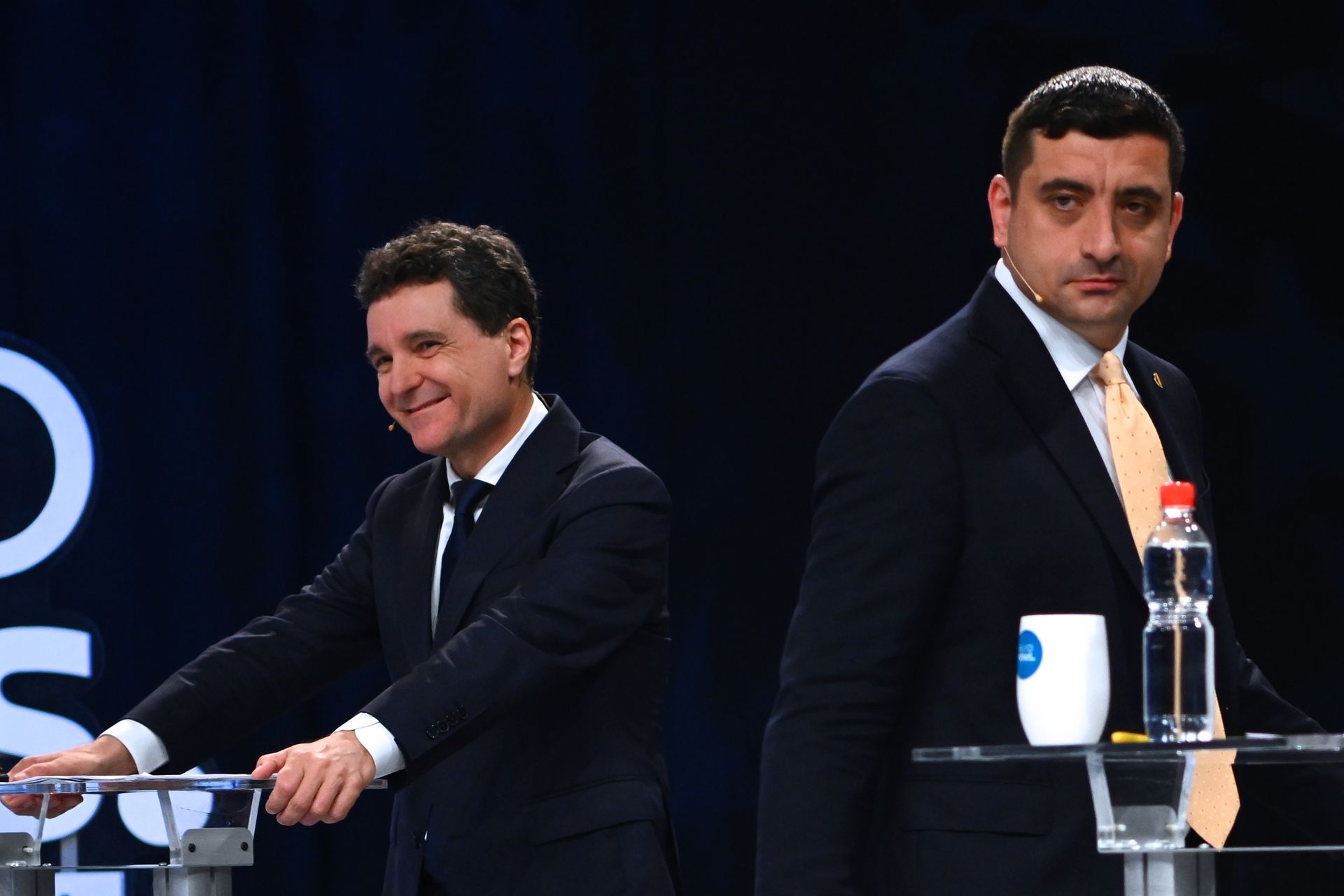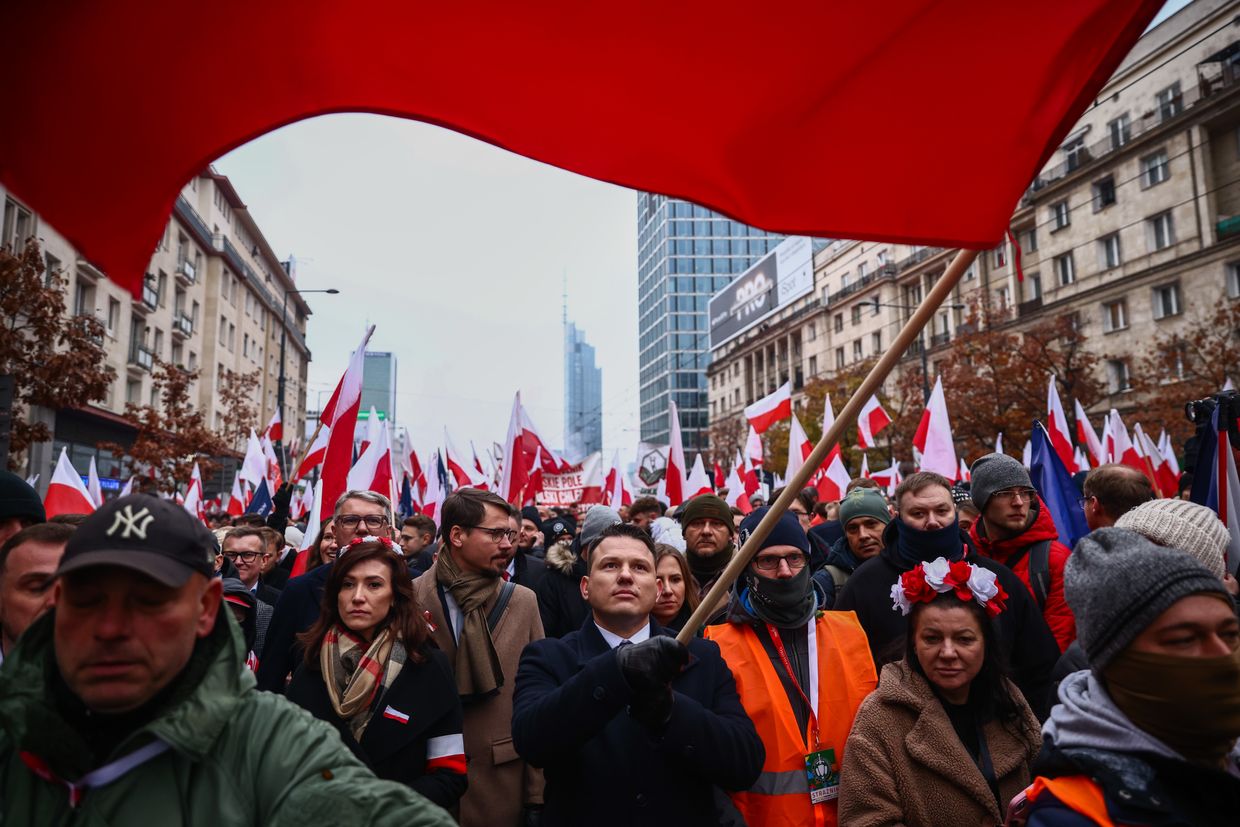Editor's note: This article has been updated to include information from Ukraine's military intelligence agency (HUR).
Poland and Romania — key NATO allies bordering Ukraine — are holding presidential elections on May 18, with both votes unfolding under the shadow of Russian interference and rising far-right influence.
The simultaneous elections are being closely watched across Europe, with growing concerns about foreign meddling and a potential shift in regional policy toward Ukraine as nationalist and pro-Russian voices gain traction.
In Romania, far-right, Eurosceptic candidate George Simion faces pro-EU Bucharest Mayor Nicusor Dan in a tight runoff.
Simion, the leader of the Alliance for the Union of Romanians (AUR), secured nearly 40% of the vote in the first round on May 4 and has called for Ukraine to compensate Romania for its aid contributions.
"Ukraine needs us, we don't need Ukraine," Simion said during a televised debate on May 8. "We certainly want compensation for Romania's participation in the war effort so far."
Simion's platform includes ending military aid for Ukraine, prioritizing national interests, and renegotiating the country's foreign commitments. If elected, his presidency could realign Romania's foreign policy at a critical moment in Russia's war against Ukraine.
Polls show the two candidates neck-and-neck, with an AtlasIntel survey on May 13 placing both at 48.2%. Voting in Romania began at 7 a.m. and will continue until 9 p.m. Romanians abroad were able to cast ballots since May 16.
Romania has played a vital role in Ukraine's defense and humanitarian response, donating a U.S.-made Patriot missile system in 2024, signing a bilateral security agreement with Kyiv, and facilitating grain exports through the Black Sea.
The current election follows the annulment of the initial first round in November 2024, which Romania's Constitutional Court invalidated over evidence of social media manipulation and foreign interference.
That round had been won by populist Calin Georgescu, who openly promoted conspiracy theories and supported Russia, calling Ukraine a "fictional state" and predicting its partition as "inevitable."

Warsaw accuses Russia of interference as Poles head to the polls
Meanwhile, in Poland, Prime Minister Donald Tusk warned on May 16 that Russian hackers attacked websites of ruling coalition parties just days before the presidential vote.
"Two days before the elections, a group of Russian hackers operating on Telegram attacked the websites of Civic Platform," Tusk wrote on X. He said the cyberattacks also targeted the Left and Polish People's Party (PSL), both members of his coalition.
Ukraine's military intelligence agency (HUR) reported on May 18 that Moscow has intensified a disinformation campaign targeting NATO and EU countries, with Poland as a central focus.
According to HUR, the operation — codenamed "Doppelganger" — uses fake media websites mimicking trusted Western outlets to publish Kremlin propaganda disguised as credible analysis.
Since March 2025, Russian intelligence services have reportedly been spreading false and manipulative messages targeting Polish voters, including on the social media platform X.
These efforts have been amplified by bot farms and artificial accounts impersonating real users, according to HUR.
Poland's Digital Affairs Minister Krzysztof Gawkowski earlier described Russia's interference as "unprecedented," alleging Moscow launched hybrid attacks to disrupt state functions and destabilize the electoral process.
The disinformation campaign coincides with a contentious presidential race. Polish voters are choosing among candidates, including Warsaw Mayor Rafal Trzaskowski, the frontrunner, and Poland 2050 leader Szymon Holownia.
Several candidates have drawn scrutiny for pro-Russian rhetoric.
Far-right candidate Slawomir Mentzen has connections to nationalist circles critical of Poland's support for Ukraine. Karol Nawrocki, backed by the conservative Law and Justice party, has been criticized for remarks seen as sympathetic to Moscow.
One episode that captured the attention of both Polish and Ukrainian media was Mentzen's spat with Lviv Mayor Andrii Sadovyi.
After visiting the western Ukrainian city on Feb. 24, Mentzen published a video near the monument to Stepan Bandera, calling the late Ukrainian nationalist a "terrorist" and accusing Ukraine of "worshipping criminals."
Bandera, assassinated by the KGB in 1959, led the radical wing of the Organization of Ukrainian Nationalists and organized the assassination of Polish Interior Minister Bronislaw Pieracki.
The Polish election, with a potential runoff on June 1, comes as the country grapples with debates over national security, migration, and European integration.
Like Romania, Poland has emerged as one of Ukraine's staunchest allies since Russia launched its full-scale invasion in 2022, providing robust military, economic, and humanitarian support.














